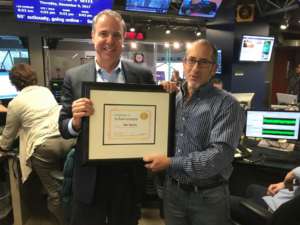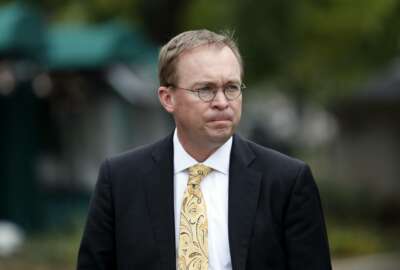
My 10,000th wake-up alarm!
Over a long working life, it's the people you remember.
This week I crossed a personal milestone. I’ve been working professionally for 40 years.
Between December 1977 and now, I married and saw two children born and become independent adults. I’ve only lost a job once, but that came with a buyout. I’ve flown 2 million miles, eaten maybe 50,000 business meals.
I’ve interviewed 10,000 people.
Man oh man, those interview subjects. They’ve ranged from CEOs and a U.S. vice president, to a woman operating a lathe turning out gun barrels for the Army. So many characters, so many situations. The famous tech CEO who insisted on having his bodyguards seated on either side while we spoke. The New Age grandson of a long-ago famous astronomer who greeted me in a wooden loft practically stark naked — and reacting to my obvious astonishment by asking if I cared to strip down, too. (I didn’t). The aerial photographer so upset with local airport opponents he was reduced to screaming, “They’re anti! They’re anti! They’re anti!” He alarmed his tiny dog, the paralyzed rear legs of which were secured to a little chariot-like device. I once interviewed a union rep trying to organize a large company. He was eating a turkey sub. He had a beard that would shame ZZ Top. During the interview, all I could concentrate on was the large blob of mayonnaise that had squeezed out of the grinder and stuck in his beard.
My arc has taken me from green worker bee to executive vice president and back to (now-seasoned) worker bee. I liked management and was good at it. But some managerial duties no balanced person enjoys. Besides, at some point, you acquire influence and leadership even without authority.
At one small newspaper, the accountant would dole out Flair pens and reporter notebooks two at a time as if they were precious. I’ve also had jobs with company cars, airline clubs, expense accounts and numerous perks. My first office consisted of the rear corner of the first floor of a converted church. A dance studio occupied the upper floors. I still hear their piano endlessly plunking out Nutcracker tunes while I’m trying to write a headline. Another office was also a corner, but enclosed, carpeted, sofa-equipped.

I’ve shivered on a picket line in the middle of the night, a cop snoring in his cruiser across the street. I’ve attended management meetings with extravagant, custom Disney musical shows commissioned just for us. I’ve helped deliver the weekly paper to the local stores at 4 a.m. in my editor’s creaky 1966 Volvo. And I’ve been flown first class to Singapore to give a speech. I’ve consumed countless lunches at my various desks. And I’ve attended literal three-martini sales lunches that didn’t end ’til about dinner time. At one restaurant in Silicon Valley, I found it hard to discuss business because of the young women parading throughout the place, modeling intimate garments.
And, of course, the technology. When I started in rural New Hampshire, we used manual Royal typewriters and people casually smoked cigarettes in the office. (That office was frequented by future Sen. Judd Gregg). At one newspaper, we typed using IBM Selectrics. Compositors down the hall fed resulting sheets into character recognition machines for converting what we’d pecked out into damp strips of type for paste-up. My first email arrived — from the Netware administrator — around 1988. QuarkXpress pushed out paste-up in the early ’90s.
All of that pre-press technology swept away compositors and paste-up people, trades that no longer exist. It also wiped out legions of copy editors, a little-understood and valuable group. Newspapers, websites, and commercial collateral are all worse than they used to be because of the dearth of copy editors.
I remember one copy editor back in Boston. She was an organic foodie 20 years before it was fashionable. She would bring a vegetable cleaning brush on camping trips. She and her husband had kept rifles under their beds during their college courtship days, convinced the Maoist revolution would break out in the U.S. at any moment. I swear no copy flaw got past her.
Newspaper offices are more sterile now. At small papers, the buildings used to smell like ink when you walk near the presses, like “hypo” when you walked near a darkroom. Offices were noisier before computers.
The web wiped out legions of reporters and editors. It inaugurated the Hamburger Helper approach to publishing, in which a tiny group of journalists populates multiple online titles. The reason is simple. Advertising online is a pennies-per-million function. Advertising in print is a dollars per thousand. Money is the oxygen of good journalism, plain and simple.
A counterbalancing force is that the web has made reporting easier in many ways. Just to get the precise name of a company at one time required consulting an encyclopedia-sized set of hardback green volumes called the Thomas Industrial Directory. Or multiple telephone calls. There was a time when you really did run out of the office, hop in a car, and go catch someone in person.
Latest Commentaries
I think often of my many colorful bosses. Only one was unfair to me, and he was drummed out before he could do any damage. Otherwise, I’m still in touch with many of them, years and years on. One had more influence on my life than any other man except my own father. I took a day off and flew to attend his retirement party at a restaurant we used to frequent for lunch. We’d have a Jameson on the rocks before the burgers or Reubens arrived, and a beer or two. He’s in his 80s now and we still have lunch once every year or so when I get up north.
About half my supervisors have been women, all of them remarkable in their own ways. One was seemingly fierce and cold. When her male supervisors transferred me, at my request, to edit the magazine she published, they warned me, if she gives you trouble, let us know. Instead, we got along famously. She was a self-made millionaire who worked because she liked to, and I learned a great deal from her. And when I moved on, she said the same thing of me.
That moving on was to Washington. For 25 years, I’ve covered the federal government in one format or another. It’s an infinitely complicated piece of machinery that never gets boring.
In a country as dynamic as ours, your corporate past can vaporize. The little weekly I started out at, miraculously, is still growing strong. That would be the Monadnock Ledger in New Hampshire, for which I covered the uniquely-named town of Jaffrey. I still have the Duraflex work boots I bought at a store there. The intervening companies — Transcript Newspapers of Dedham, Massachusetts; Cahners Publishing of Boston; The Washington Post Company — have all disappeared. There’s still a Washington Post, but it’s owned by someone distant and, to my mind, strange. True story: Once at a gathering at Katharine Graham’s house in Georgetown, son Donald Graham walked in. I said to him: “You’re the only one here who can go into the refrigerator and drink milk from the carton.” I’ll never forget the look on his face. I’m not name-dropping. Mrs. Graham didn’t know me from Adam, although Don Graham seemed to know everyone who worked in his then-empire, whether at the newspaper or at one of the affiliate companies such as where I worked.
When they sold my government focused pubs, a year later I was a neophyte again. After three decades in publishing, I was a broadcaster. Now I’ve been on the air for 10 years. I lucked out, because the WTOP/WFED building is filled with people who are glad to help.
Forty years. I’ve enjoyed my work, most of it anyhow. I think I’ve contributed a thing or two. And I’m grateful for the colleagues, mentors, sources, readers, listeners, ad salespeople, accountants and sundry corporate denizens that one touches in a working life. Many become friends. I think the fear of retirement is really the fear of loss of identity and community. It’s important to have a varied, involved life outside of work. Some days I long to sleep in, and, I don’t know, go running along the river or take my motorcycle and head somewhere for lunch. Maybe just finish that 800-page biography of Churchill I started years ago. Still, I plan to keep working. The main reason: I still love it.
Keep tuning in, will you?
Copyright © 2025 Federal News Network. All rights reserved. This website is not intended for users located within the European Economic Area.
Tom Temin is host of the Federal Drive and has been providing insight on federal technology and management issues for more than 30 years.
Follow @tteminWFED






